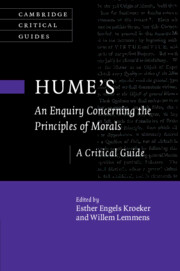Book contents
- Hume’s An Enquiry Concerning the Principles of Morals
- Cambridge Critical Guides
- Hume’s An Enquiry Concerning the Principles of Morals
- Copyright page
- Contents
- Contributors
- Acknowledgments
- Abbreviations
- Introduction
- Chapter 1 The Nature of Morals Founded on the Human Fabric
- Chapter 2 The Pride of Pericles
- Chapter 3 Justice and Politics in the Enquiry Concerning the Principles of Morals
- Chapter 4 History, Context, and the Conventions of Political Society
- Chapter 5 “Why Utility Pleases”
- Chapter 6 Hume on Talents and Moral Virtues
- Chapter 7 Virtues Suspect and Sublime
- Chapter 8 Sympathy and the Sources of Moral Sentiment
- Chapter 9 Virtue and Moral Psychology in the Enquiry Concerning the Principles of Morals
- Chapter 10 Hume, Cicero, and the Ancients
- Chapter 11 Hume on Religion in the Enquiry Concerning the Principles of Morals
- Chapter 12 Moral Disagreement
- Bibliography
- Index
- Cambridge Critical Guides
Chapter 3 - Justice and Politics in the Enquiry Concerning the Principles of Morals
Published online by Cambridge University Press: 08 January 2021
- Hume’s An Enquiry Concerning the Principles of Morals
- Cambridge Critical Guides
- Hume’s An Enquiry Concerning the Principles of Morals
- Copyright page
- Contents
- Contributors
- Acknowledgments
- Abbreviations
- Introduction
- Chapter 1 The Nature of Morals Founded on the Human Fabric
- Chapter 2 The Pride of Pericles
- Chapter 3 Justice and Politics in the Enquiry Concerning the Principles of Morals
- Chapter 4 History, Context, and the Conventions of Political Society
- Chapter 5 “Why Utility Pleases”
- Chapter 6 Hume on Talents and Moral Virtues
- Chapter 7 Virtues Suspect and Sublime
- Chapter 8 Sympathy and the Sources of Moral Sentiment
- Chapter 9 Virtue and Moral Psychology in the Enquiry Concerning the Principles of Morals
- Chapter 10 Hume, Cicero, and the Ancients
- Chapter 11 Hume on Religion in the Enquiry Concerning the Principles of Morals
- Chapter 12 Moral Disagreement
- Bibliography
- Index
- Cambridge Critical Guides
Summary
Hume’s signature contribution to the theory of justice has long been taken to consist in the Treatise’s argument for justice as an artificial virtue. Yet Hume’s re-presentation of his theory of justice in the Enquiry Concerning the Principles of Morals makes no reference whatsoever to justice as an artificial virtue. Given this fundamental difference, interpreters are compelled to explain what exactly changed in Hume’s shift from one sort of account to another, as well as what, if anything, is significant in Hume’s mature theory of justice once the idea of justice’s artificiality has been taken off the table. The present essay focuses on two key sections of the second Enquiry – “Of Justice” and “Some Farther Considerations with Regard to Justice” – to argue for two claims. First, in shifting away from the debate over whether justice is natural or artificial, the second Enquiry focuses instead on how political actors and political orders enable natural justice to be operationalized in practical life. Second, Hume’s account of justice in the second Enquiry reveals a crucial albeit underemphasized aspect of his moral epistemology, namely the crucial role played by reason in moral motivation and evaluation.
- Type
- Chapter
- Information
- Hume's An Enquiry Concerning the Principles of MoralsA Critical Guide, pp. 53 - 71Publisher: Cambridge University PressPrint publication year: 2021
- 2
- Cited by

